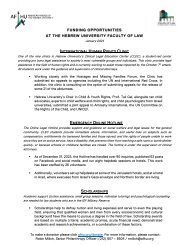Create successful ePaper yourself
Turn your PDF publications into a flip-book with our unique Google optimized e-Paper software.
The ‘Teflon’ Solution: Eliminating<br />
Hospital-Borne Infections<br />
Every year close to one million<br />
Americans end up spending weeksand-even<br />
months-in hospitals as<br />
a result of antibiotic-resistant or<br />
“superbug” infections they picked<br />
up in the very institutions that were<br />
supposed to improve their health.<br />
About 100,000 of those people will<br />
die each year from these methicillinresistant<br />
Staphylococcus aureus<br />
(MRSA) infections.<br />
A Hebrew University chemistry<br />
lab, led by Dr. Meital Reches, has<br />
recently developed a ground-breaking<br />
solution that would prevent infections<br />
like these, saving countless lives and<br />
lowering healthcare costs. Bacteriaprone<br />
surfaces like hospital floors,<br />
walls and medical equipment could<br />
simply be coated in a transparent<br />
spray that would prevent bacteria from<br />
taking root, explains Reches from her<br />
office at the Institute of Chemistry on<br />
the Edmond J. Safra Campus. Reches<br />
recently developed and patented this<br />
solution which will soon be available<br />
through the start-up, NanoAF.<br />
NanoAF’s non-toxic and inexpensive<br />
coating lasts at least one year, which<br />
is considerably longer than the<br />
application of cleaning products. Just<br />
as significantly, it does not contribute<br />
to the growth of antibiotic resistant<br />
bacteria, a problem with many germkilling<br />
cleaning products, and one of<br />
the reasons so many superbugs exist<br />
today. The basis of NanoAF’s coating<br />
is a simple molecule developed in<br />
Reches’s lab that sticks to surfaces and<br />
creates a smooth Teflon-like layer that<br />
repels bacteria, says Reches.<br />
Winning the Cancer Battle<br />
“Cancer will become a chronic<br />
disease in the near future, rather than<br />
an oft-fatal condition,” predicts Dr.<br />
Ofra Benny, a Senior Lecturer in the<br />
School of Pharmacy and the Institute<br />
for Drug Research. Benny is among<br />
several researchers at the Hebrew<br />
University developing new approaches<br />
to cancer treatment and detection.<br />
In the fictional Star Trek universe,<br />
the medical tricorder is a scanning<br />
device used by doctors to help<br />
diagnose disease and collect bodily<br />
information about a patient. Benny’s<br />
colleague, Faculty of Medicine’s Prof.<br />
Yuval Dor, has recently developed a<br />
blood test that could be compared to<br />
a modern-day tricorder in that it can<br />
detect the early stages of diseases<br />
such as diabetes or Alzheimer’s, and<br />
especially cancer, says Dor, who is a<br />
member of the Institute for Medical<br />
Research Israel-Canada (IMRIC).<br />
Building on the groundbreaking<br />
genetics work of HU Prof. Howard<br />
Cedar, and in collaboration with<br />
methylation expert Dr. Ruth<br />
Shemer and Prof. Benjamin<br />
Glaser from Hadassah Medical Center,<br />
Dor explains that the test detects the<br />
signs of cell death which occur in the<br />
body long before other symptoms of<br />
cancer appear.<br />
“It’s really a window into the human<br />
body and into tissue dynamics,” says<br />
Dor of the test, which is still in the<br />
laboratory phase of development, but<br />
might soon be commercially available<br />
as an annual diagnostic tool for the<br />
general population.<br />
Such early detection of disease<br />
–although extremely important- is<br />
not always a guarantee for effective<br />
treatment, especially when dealing<br />
with cancer. In one of the most<br />
devastating challenges in medicine<br />
today, cancer often does not respond to<br />
treatments that were proven effective<br />
in labs, Benny explains. Medicines<br />
that were successful in labs frequently<br />
cannot penetrate the actual tumor due<br />
to the tumor’s micro environment and<br />
the network of blood vessels that are<br />
unique to tumors. To illustrate her<br />
point, over a coffee in the Belgium<br />
House café, she quickly sketches a<br />
tumor on a notepad showing how the<br />
blood vessels that support cancers are<br />
less tightly constructed than normal<br />
blood vessels due to their rapid and<br />
erratic growth. This, in turn, causes the<br />
blood vessels to leak fluid, leading to a<br />
high-pressure system inside the tumor,<br />
rendering it mechanically impossible<br />
for drug molecules in the blood stream<br />
to enter it, she explains.<br />
To solve this problem,<br />
Benny and her team of<br />
researchers have<br />
developed a nanoparticle<br />
that can be loaded<br />
with anti-cancer<br />
drugs and is<br />
designed to<br />
the correct<br />
dimensions<br />
to enter the<br />
tumor through<br />
the gaps inside<br />
the tumor’s blood<br />
vessels. Because of<br />
the nanoparticle’s<br />
specific size, it<br />
cannot enter the<br />
tightly<br />
constructed<br />
normal blood<br />
vessel systems<br />
of healthy organs,<br />
drastically<br />
“Cancer will become a chronic disease in the near future,<br />
rather than an oft-fatal condition,” Dr. Ofra Benny<br />
<strong>2017</strong>-2018 7

















